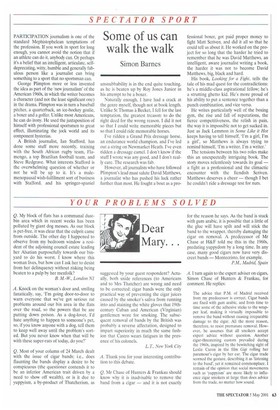Some of us can walk the walk
Simon Barnes
PARTICIPATION journalism is one of the standard Mephistophelean temptations of the profession. If you work in sport for long enough, you cannot avoid the notion that if an athlete can do it, anybody can. Or perhaps it's a belief that an intelligent, articulate, selfdeprecating, witty, humble and generally fabulous person like a journalist can bring something to a sport that no sportsman can.
George Plimpton more or less invented the idea as part of the 'new journalism' of the American 1960s, in which the writer becomes a character (and not the least significant one) in the drama. Plimpton was in turn a baseball pitcher, a quarterback, an ice-hockey goalie, a boxer and a golfer. Unlike most Americans, he can do irony. He used the juxtaposition of himself with professional sportsmen to great effect, illuminating the jock world and its component hysterias.
A British journalist, Ian Stafford, has done some stuff more recently, training with the South African rugby team, Flamengo. a top Brazilian football team, and Steve Redgrave. What interests Stafford is the overwhelming question of whether or not he will be up to it. It's a malemenopausal wish-fulfilment sort of business with Stafford, and his springer-spaniel unsnubbability is in the end quite touching, as he is beaten up by Roy Jones Junior in his attempt to be a boxer.
Naturally enough, I have had a crack at the genre myself, though not at book length. Unlike St Thomas a Becket, I fell for the last temptation, the greatest treason: to do the right deed for the wrong reason. I did it not so that I could write memorable pieces but so that I could ride memorable horses.
I've ridden a Grand Prix dressage horse, an endurance world champion, and I've led Out a string on Newmarket Heath. I've even ridden a dressage camel. I don't know if the stuff I wrote was any good, and I don't really care. The research was fab.
However, all journalists who have followed Plimpton's lead must salute David Matthews, a journalist who has pushed his luck rather further than most. He fought a bout as a pro fessional boxer, got paid proper money to fight Matt Scriven, and did it all so that he could tell us about it. He worked on the project for so long that the harder he tried to remember that he was David Matthews, an intelligent, aware journalist writing a book, the harder it was not to become David Matthews. big, black and bard.
His book, Looking for a Fight, tells the tale of his mad quest for the contradictions: he's a middle-class aspirational fellow; he's a strutting ghetto kid. He's more proud of his ability to put a sentence together than a punch combination, and vice versa.
He writes particularly well of the boxing gym, the rise and fall of reputations, the fierce competitiveness, the relish in pain, the way it is impossible not to get sucked in. Just as Jack Lemmon in Some Like it Hot keeps having to tell himself, 'I'm a girl, I'm a girl', so Matthews is always trying to remind himself, 'I'm a writer, I'm a writer.'
The tensions between his two roles make this an unexpectedly intriguing book. The story moves relentlessly towards its goal — a fight as a professional and the climactic encounter with the fiendish Scriven. Matthews deserves a cheer — though I bet he couldn't ride a dressage test for nuts.










































































 Previous page
Previous page